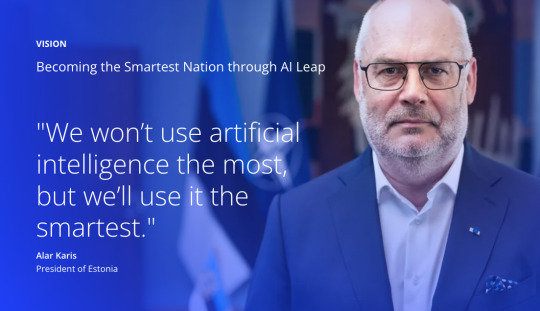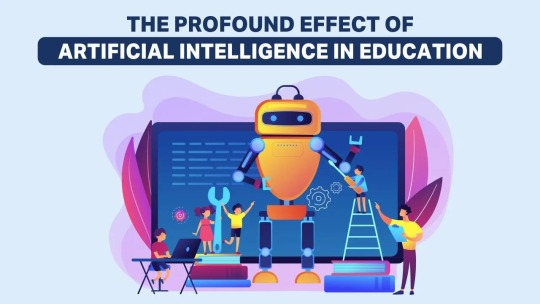#Artificial Intelligence in Education
Explore tagged Tumblr posts
Text
🚀 Estonia is leading the AI-powered education revolution! With AI Leap 2025, the country is integrating artificial intelligence into schools nationwide. Will New Zealand and the rest of the world follow? Dive into the future of learning and join the conversation! 👇 #AIEducation #FutureOfLearning

View On WordPress
#AI and students#AI in schools#AI Leap 2025#AI policy#AI tutoring#AI-Powered Education#artificial intelligence in education#Digital Learning#Edtech#Education Technology#Estonia AI#Estonia digital transformation#future of education#global education trends#government AI initiatives#Graeme Smith#Personalized Learning#smart classrooms
0 notes
Text
0 notes
Text
Artificial Intelligence in Education Market

Global Artificial Intelligence in Education Market Report
The Artificial Intelligence in Education Market research report offers an in-depth analysis of market dynamics, competitive landscapes, and regional growth patterns. This comprehensive report provides businesses with the strategic insights necessary to identify growth opportunities, manage risks, and develop effective competitive strategies in an ever-evolving market.
According to Straits Research, the global Artificial Intelligence in Education market size was valued at USD 3.25 billion in 2023. It is projected to reach from USD 4.43 billion in 2024 to USD 53.11 billion by 2032, growing at a CAGR of 36.4% during the forecast period (2024–2032).
Request a Sample Report Today @ https://straitsresearch.com/report/artificial-intelligence-in-education-market/request-sample
Global Artificial Intelligence in Education Market Segmental Analysis
As a result of the Artificial Intelligence in Education market segmentation, the market is divided into sub-segments based on product type, application, as well as regional and country-level forecasts.
By Component
Solution
Services
By Deployment Type
On-premises
Cloud-based
By Technology
Machine Learning
Deep learning
Natural Language Processing (NLP)
Others
By Applications
ITS
Virtual Facilitators
Content Delivery Systems
Interactive Websites
Chatbots
Others
By End-User
Higher Education
K-12 Education
Corporate Training
Others
You can check In-depth Segmentation from here: https://straitsresearch.com/report/artificial-intelligence-in-education-market/segmentation
Why Invest in this Report?
Leverage Data for Strategic Decision-Making: Utilize detailed market data to make informed business decisions and uncover new opportunities for growth and innovation.
Craft Expansion Strategies for Diverse Markets: Develop effective expansion strategies tailored to various market segments, ensuring comprehensive coverage and targeted growth.
Conduct Comprehensive Competitor Analysis: Perform in-depth analyses of competitors to understand their market positioning, strategies, and operational strengths and weaknesses.
Gain Insight into Competitors' Financial Metrics: Acquire detailed insights into competitors' financial performance, including sales, revenue, and profitability metrics.
Benchmark Against Key Competitors: Use benchmarking to compare your business's performance against leading competitors, identifying areas for improvement and potential competitive advantages.
Formulate Region-Specific Growth Strategies: Develop geographically tailored strategies to capitalize on local market conditions and consumer preferences, driving targeted business growth in key regions.
List of Top Leading Players of the Artificial Intelligence in Education Market -
International Business Machines Corporation
Google
Pearson
Microsoft
Cognizant
Amazon Web Services Inc.
DREAMBOX LEARNING
Fishtree Inc.
BridgeU
Jellynote
Metacog Inc.
Reasons to Purchase This Report:
Access to Comprehensive Information: Gain access to an extensive collection of analysis, research, and data that would be challenging to acquire independently. This report offers valuable insights, saving you considerable time and effort.
Enhanced Decision-Making: Equip yourself with detailed insights into market trends, consumer behavior, and key industry factors. This report provides essential information for strategic planning, including decisions on investments, product development, and marketing strategies.
Achieving Competitive Advantage: Stay ahead in your industry by understanding market dynamics and competitor strategies. This report delivers deep insights into competitor performance and market trends, enabling you to craft effective business strategies and maintain a competitive edge.
Credibility and Reliability: Trust in the expertise of industry professionals and the accuracy of thoroughly researched data. Authored by experts and grounded in rigorous research and analysis, this report enhances credibility and reliability.
Cost-Effective Research: Reduce research expenses by investing in this comprehensive report instead of conducting independent research. It provides a cost-effective means of accessing detailed analysis and insights on a specific topic without requiring extensive resources.
Regional Analysis Artificial Intelligence in Education Market
The regional analysis section of the report offers a thorough examination of the global Artificial Intelligence in Education markets, detailing the sales growth of various regional and country-level markets. It includes precise volume analysis by country and market size analysis by region for both past and future periods. The report provides an in-depth evaluation of the growth trends and other factors impacting the Artificial Intelligence in Education markets in key countries, such as the United States, Canada, Mexico, Germany, France, the United Kingdom, Russia, Italy, China, Japan, Korea, India, Southeast Asia, Australia, Brazil, and Saudi Arabia. Moreover, it explores the progress of significant regional markets, including North America, Europe, Asia-Pacific, South America, and the Middle East & Africa.
Buy Now @ https://straitsresearch.com/buy-now/artificial-intelligence-in-education-market
About Straits Research
Straits Research is dedicated to providing businesses with the highest quality market research services. With a team of experienced researchers and analysts, we strive to deliver insightful and actionable data that helps our clients make informed decisions about their industry and market. Our customized approach allows us to tailor our research to each client's specific needs and goals, ensuring that they receive the most relevant and valuable insights.
Contact Us
Email: [email protected]
Address: 825 3rd Avenue, New York, NY, USA, 10022
Tel: UK: +44 203 695 0070, USA: +1 646 905 0080
#Artificial Intelligence in Education#Artificial Intelligence in Education Industry#Artificial Intelligence in Education Share#Artificial Intelligence in Education Size#Artificial Intelligence in Education Trends#Artificial Intelligence in Education Regional Analysis#Artificial Intelligence in Education Growth Rate
0 notes
Text
AI Learning Tools for Education in 2024: A Teacher’s Guide [Blogger Review] Table of Contents TL;DR: Discover 9 game-changing AI tools that are revolutionizing education in 2024. From lesson planning to assessment creation, find the perfect tool for your classroom needs. Includes free options for teachers on a budget! Why You Need AI Learning Tools Top AI Education Tools How to…

View On WordPress
#ai education tools#artificial intelligence in education#Classroom AI#classroom management tools#EdTech tools 2024#educational technology#lesson planning software#teacher resources#teaching assistant software#teaching technology
0 notes
Text
Artificial Intelligence in Education
Artificial intelligence in education is the use of intelligent technologies to customize learning, enhance teaching methodologies, and strengthen the position of students and tutors. After much debate, it has been proven that AI in education is not just about replacing teachers with robots but about using artificial intelligence tools to help in the process of learning.
Examples of Artificial Intelligence in Education Technology is rapidly transforming education, and Artificial Intelligence (AI) is at the forefront of this change. From chatbots that personalize learning to virtual reality that creates immersive experiences, AI is impacting classrooms in various exciting ways.
Adaptive Learning Platforms
AI-powered tools that are able to assess the students’ strengths and weaknesses, and then cater to their needs by customizing lessons and exercises according to those individual needs.
Learning Management Systems (LMS) with AI
These centralized platforms streamline course management and allow teachers to assign work to students and communicate with parents to track their progress. AI-powered intelligent tutors can analyze student performance and provide personalized support within the LMS, identifying areas needing improvement and offering targeted resources.
Intelligent Tutors and Engaging Chatbots
Through the use of artificial intelligence, virtual tutors can give students explanations, answer their questions on-demand, and provide practice problems. Chatbots can act as virtual study buddies who keep reminding students of deadlines, send them motivational messages, and answer their questions about any concepts that they don’t understand.
Artificial Intelligence for Grading and Feedback
The possibility of freeing teachers from manually grading multiple-choice questions and essays, so they can spend more time providing personalized feedback. Moreover, AI will examine a student’s progress data to identify possible weak points.
For more information: https://www.ivedahelp.com/education/artificial-intelligence-in-education/

0 notes
Text
Why AI Courses are in High Demand among Professionals

Nowadays, AI or artificial intelligence is transforming the world. With this, the demand for professionals who can use the strengths of AI is increasing day by day. With the advent and growth of AI, many people are using AI systems to work easily.
The future of every sector demands that professionals have AI skills to stay ahead in this competitive job market. Thus, today, many AI courses are in high demand. Many students and professionals are trying to learn several technical and non-technical AI certification courses to get good jobs.
So, let us see why an Artificial intelligence course is becoming essential for career growth.
What is Artificial Intelligence?
AI is a branch of computer science that can create intelligent machines that work like humans. The process of creating these intelligent machines is powered by AI. These machines work in the same way as we humans while working with data and making the right decisions.
Reasons AI Courses are in High Demand
● It Offers Job Security
In this digital era, the job market is evolving, so employers are looking for skilled professionals. Today, AI skills have become quite valuable, and hence, professionals who have AI skills can get secure jobs quite easily.
Whether it’s analyzing data, creating AI algorithms, or using the right AI solutions, these skills are in high demand. Thus, with AI courses and skills, professionals can enjoy job security and career growth.
● It is Transforming Every Industry
Nowadays, AI isn’t only for tech companies, as it can help every sector. From finance, where it can predict stock trends to healthcare, where AI can diagnose diseases, AI is transforming everything.
Thus, professionals who have strong knowledge of AI are now changing how a company operates. Thus, these professionals can help their companies to stay ahead of the competition.
● It Offers Data-Driven Decisions
Data is crucial for the success of any business. There are many AI courses that teach professionals the right way to analyze large volumes of data, along with getting important insights.
Skilled professionals, who can use AI, are able to easily handle complex problems. Thus, they can improve business outcomes quite easily.
● It Can Drive Innovation
Today, businesses are trying to find ways to improve and innovate. AI can offer some powerful tools that can help many companies to improve.
Thus, professionals with remarkable AI skills can help their companies to streamline operations, develop new products, and improve customer experience. This ability to drive innovation can easily help a company to become successful in the market.
● It Can Help in Personal Growth
Learning some AI skills are both intellectually stimulating and exciting. It offers professionals a scope to solve complex issues, and use cutting-edge technology. This incredible personal growth can prove to be rewarding after some time.
● It Improves User Experience
Products of AI technology like virtual assistants and chat bots can help a lot in increasing user experience. Thus, companies are looking for skilled AI professionals nowadays.
Thus, in this new era, companies are now looking for professionals who have completed at least one AI Certification Course. Hence, students are searching for the best AI courses for beginners that can help them to become successful.
#ai certification course#ai courses#ai training#artificial intelligence consulting#artificial intelligence in education#artificial intelligence training#ai consulting services#ai training courses#artificial intelligence course#Artificial Intelligence training for student#Best Artificial intelligence Course#Artificial Intelligence consulting services#Artificial intelligence consulting#Artificial intelligence Training
1 note
·
View note
Text
The Transformative Power of Artificial Intelligence in Education

Artificial intelligence (AI) is revolutionizing various industries, and education is no exception. The integration of AI in education is creating a more personalized, efficient, and engaging learning experience. From personalized learning plans to automated grading, AI is enhancing the educational landscape in ways previously unimaginable. This blog explores the myriad Artificial Intelligence in Education and how it is shaping the future of learning.
Personalized Learning
One of the most significant impacts of Artificial intelligence application in education is personalized learning. AI algorithms analyze a student’s learning style, strengths, and weaknesses to create customized learning plans. This personalized approach ensures that students receive content tailored to their individual needs, thereby improving their understanding and retention of the material.
Adaptive Learning Platforms
Adaptive learning platforms are a prime example of AI application in education. These platforms use machine learning algorithms to adjust the difficulty level of tasks based on a student’s performance. For instance, if a student is struggling with a particular concept, the system provides additional resources and practice exercises to help them master the topic. Conversely, if a student excels in a specific area, the platform presents more challenging material to keep them engaged.
Intelligent Tutoring Systems
Intelligent tutoring systems (ITS) leverage AI to provide real-time feedback and support to students. These systems simulate one-on-one tutoring by analyzing student responses and providing hints, explanations, and corrections as needed. ITS can also identify common misconceptions and tailor instruction to address these gaps, ensuring that students build a solid foundation of knowledge.
Enhanced Administrative Efficiency
Artificial intelligence is also streamlining administrative tasks in education, allowing educators to focus more on teaching and less on paperwork. AI-powered systems can automate routine tasks such as attendance tracking, scheduling, and grading, significantly reducing the administrative burden on teachers and school staff.
Automated Grading
Grading assignments and exams is a time-consuming task for educators. AI-based grading systems can quickly and accurately assess multiple-choice tests, essays, and even complex assignments. These systems use natural language processing (NLP) and machine learning algorithms to evaluate student work, providing detailed feedback and identifying areas for improvement. Automated grading not only saves time but also ensures consistent and objective assessment.
Smart Scheduling
AI can optimize school schedules by considering various factors such as teacher availability, student preferences, and classroom resources. Smart scheduling systems use algorithms to create efficient timetables that minimize conflicts and ensure optimal use of school facilities. This not only enhances the learning experience but also improves overall school management.
AI in Special Education
Artificial intelligence is making significant strides in special education by providing tailored support to students with diverse learning needs. AI-powered tools and applications can assist students with disabilities, offering them greater access to educational opportunities and helping them achieve their full potential.
Speech Recognition and Language Processing
For students with speech or language impairments, AI-powered speech recognition and language processing tools can be invaluable. These tools can convert spoken language into text, allowing students to participate in classroom discussions and complete assignments more easily. Additionally, AI can provide real-time language translation, helping non-native speakers understand and engage with the curriculum.
Assistive Technologies
AI-driven assistive technologies, such as text-to-speech and predictive text applications, can support students with reading and writing difficulties. These tools enhance accessibility and ensure that all students can actively participate in the learning process. For example, text-to-speech applications can read aloud textbooks and other educational materials, while predictive text applications can help students with dyslexia write more efficiently.
Data-Driven Decision Making
Artificial intelligence in education is empowering educators and administrators to make data-driven decisions. By analyzing vast amounts of data, AI systems can provide insights into student performance, identify trends, and predict future outcomes. This information enables educators to develop targeted interventions and strategies to improve student achievement.
Early Warning Systems
AI-powered early warning systems can identify students at risk of falling behind or dropping out. These systems analyze various data points, such as attendance, grades, and engagement levels, to predict which students may need additional support. Educators can then intervene early, providing the necessary resources and guidance to help at-risk students stay on track.
Curriculum Development
AI can assist in curriculum development by analyzing educational data and identifying gaps in the current curriculum. This allows educators to design more effective learning materials and activities that address students’ needs. Additionally, AI can provide real-time feedback on the effectiveness of new teaching methods and resources, enabling continuous improvement.
Challenges and Ethical Considerations
While the benefits of artificial intelligence in education are numerous, there are also challenges and ethical considerations to address. Privacy concerns, data security, and the potential for algorithmic bias are critical issues that educators and policymakers must navigate.
Privacy and Data Security
The use of AI in education involves the collection and analysis of vast amounts of student data. Ensuring the privacy and security of this data is paramount. Schools and educational institutions must implement robust data protection measures and adhere to privacy regulations to safeguard student information.
Algorithmic Bias
AI systems are only as unbiased as the data they are trained on. If the training data contains biases, the AI system may perpetuate or even amplify these biases. Educators and developers must work together to ensure that AI applications in education are fair, transparent, and equitable.
Conclusion
Artificial intelligence is transforming education by providing personalized learning experiences, enhancing administrative efficiency, supporting special education, and enabling data-driven decision-making. While there are challenges and ethical considerations to address, the potential benefits of AI in education are immense. As technology continues to evolve, AI will undoubtedly play an increasingly significant role in shaping the future of education, ensuring that all students have the opportunity to succeed.
0 notes
Text
The Role of Technology in Unveiling Knowledge Horizons
Introduction In today’s rapidly evolving world, technology plays a pivotal role in reshaping the horizons of knowledge. The unprecedented pace at which technology advances enables us to access, analyze, and disseminate information like never before. This article delves into how technology is unveiling new knowledge horizons, transforming education, research, communication, and societal…

View On WordPress
#Artificial intelligence in education#Augmented reality learning#Big data analytics in research#Blogs and online publications#Bridging the knowledge gap#Collaborative research platforms#Digital Libraries#Digital literacy campaigns#E-learning platforms#Global collaboration in research#Knowledge dissemination#Online education#Open access journals#Podcasts and webinars#Remote learning programs#Social media and knowledge sharing#Technology and education#Telemedicine and healthcare#Virtual reality in education
0 notes
Text
0 notes
Text
AI in Education: Making Learning Easier and More Fun
Artificial Intelligence in education is a transformative force that leverages data-driven insights and personalized learning algorithms to revolutionize how students learn and educators teach. By tailoring content, tracking progress, and offering targeted support, AI empowers both students and teachers to achieve better outcomes and adapt to the ever-evolving landscape of education.
#AI in education#Artificial intelligence in education#Artificial Intelligence Course Delhi#AI course Delhi
0 notes
Text
The Profound Effect of Artificial Intelligence in Education

Artificial Intelligence in education is revolutionizing learning by tailoring experiences, automating administrative tasks, and personalizing instruction. Furthermore, the adaptive algorithms enhance student engagement and assessment accuracy, fostering a dynamic and efficient educational landscape for the future.
0 notes
Text
Just ask AI 🤔
#pay attention#educate yourselves#educate yourself#knowledge is power#reeducate yourselves#reeducate yourself#think about it#think for yourselves#think for yourself#do your homework#do your research#do some research#do your own research#ask yourself questions#question everything#ai#artificial intelligence#escape the matrix#truth be told#news#you decide
795 notes
·
View notes
Text
The Visionary in a Stagnating World: Alfons Scholing’s Socio-Economic Prognosis for the Netherlands and Beyond
By Alfons Scholing, CEO of Alfons Design & Founder of Ik Zie Zombies In a world dominated by rapid technological, social, and political changes, few individuals stand out as true trendsetters—those capable of perceiving the world not as it is, but as it will be. I, Alfons Scholing, as the CEO of Alfons Design and founder of the artist platform Ik Zie Zombies, embody this role. My life took a…
#Academic analysis#Academic Insights#academic perspectives#advanced education#advanced governance systems#advanced learning#advanced learning societies#advanced political systems#advanced political thought#advanced robotics#advanced societies#Advanced Technology#advanced technology-driven societies#advanced urban planning#Art and Culture#artificial intelligence#artificial intelligence ethics#artificial intelligence future#artificial intelligence governance#artificial intelligence in education#artificial intelligence in society#artificial intelligence in the workforce#artificial intelligence innovations#artificial intelligence trends#Artistic Expression#child intelligence#child prodigies#child prodigy intelligence#civil rights#civil rights movements
0 notes
Text
Warm Take: The proliferation of AI-based plagiarism in higher education is based partly in the years-in-the-making general social/economic narrative that a college degree is an essential line on your résumé, required for getting any halfway decent job. The more a degree became a universally requisite prize, the more it became just a prize—and not even as impressive a prize, because everyone has one, don’t they? So it’s little more than a participation ribbon, received by going through the motions. That school, any level of school, is meant to be for the purpose of learning; that more advanced schooling is meant to result in, & should be taken by people who want, advanced learning, of new facts and moreover of how to think about new facts—this is being culturally forgotten. All that matters is the end-goal of the line on the résumé—so why not just let the computer generate something?
334 notes
·
View notes
Text
77 notes
·
View notes